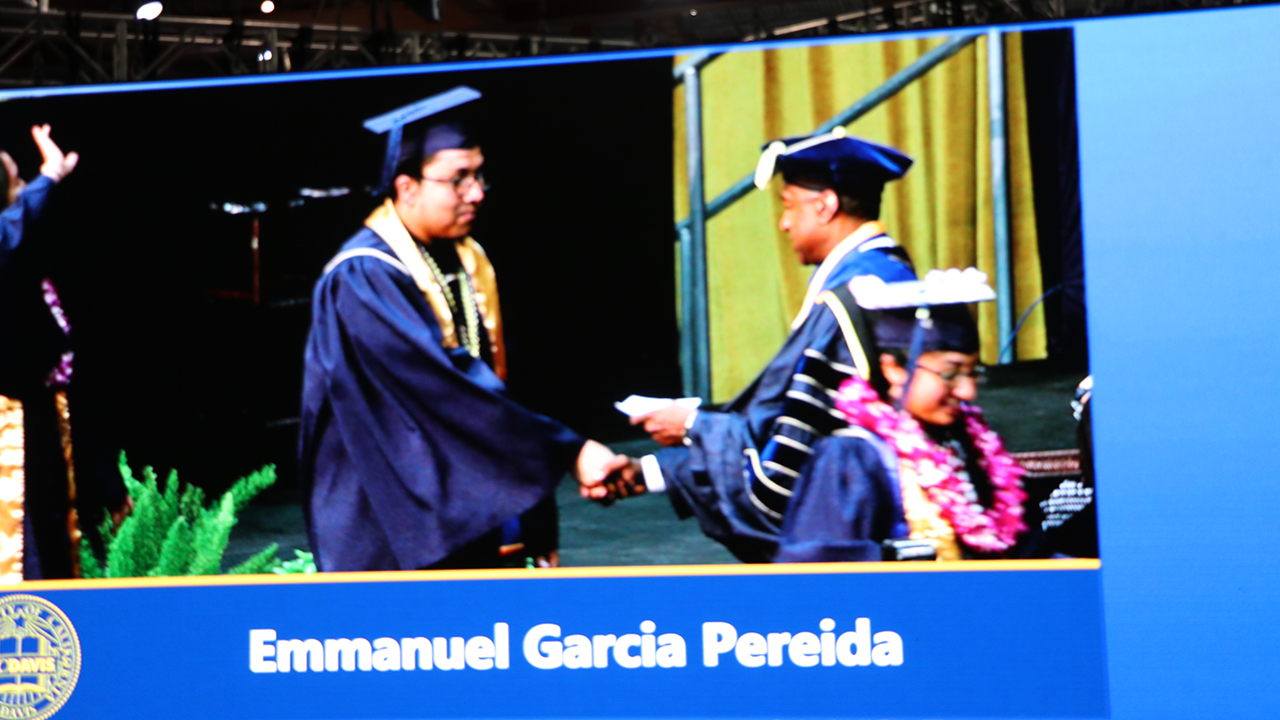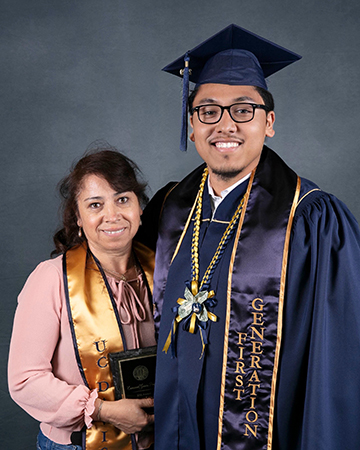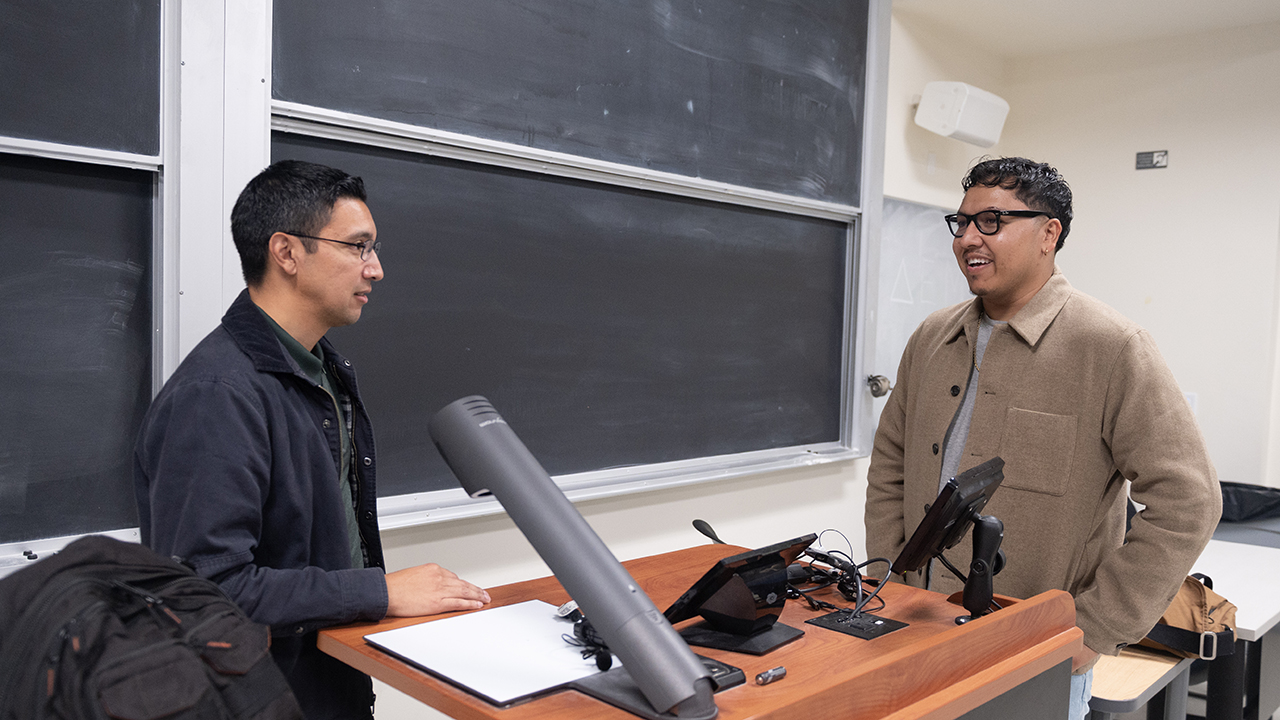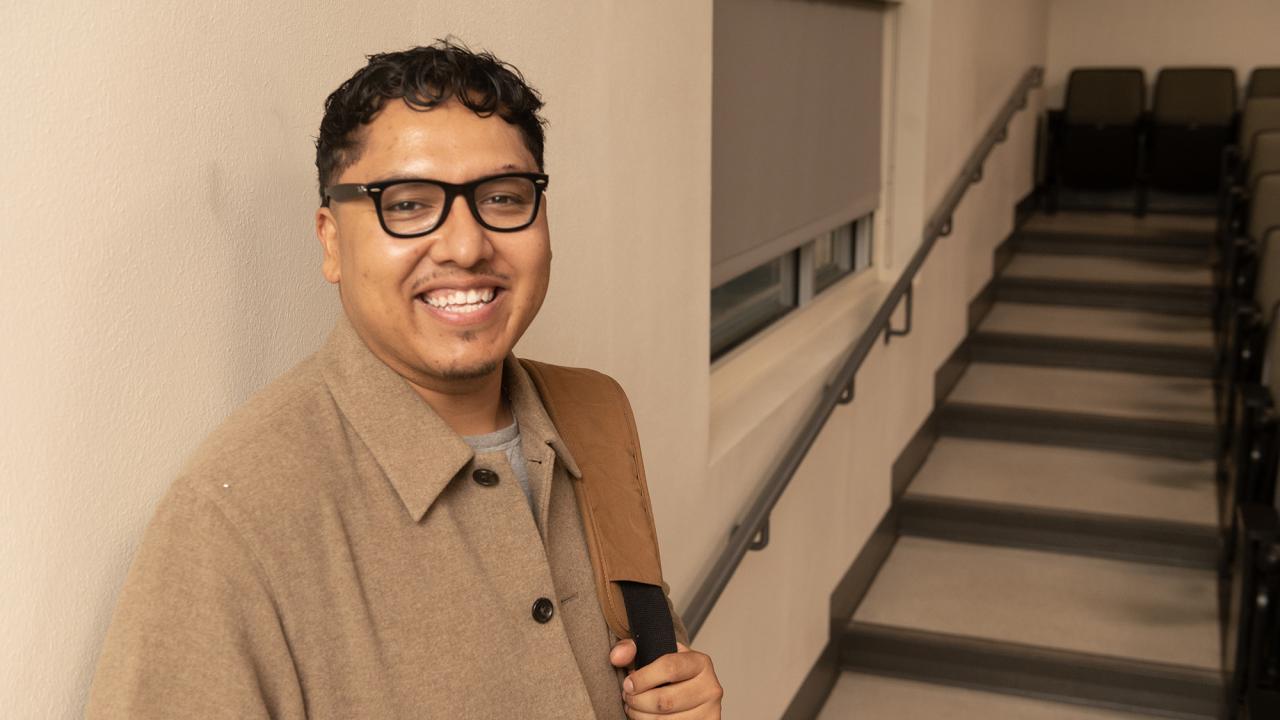Emmanuel “Manny” Garcia Pereida of Oakland wore a UC Davis cap and gown with a stole identifying him as a first-generation college graduate. His name sounded over the arena’s speakers. He crossed the stage and shook hands with the chancellor. His family cheered.

A month later, in July 2019, Garcia Pereida learned the pomp and circumstance did not belong to him: He was eight credits short of earning his bachelor’s degree.
“I was so confused, disappointed,” he said. “I had worked so hard.”
Even after struggles through community college — and then this — Garcia Pereida would rediscover the resolve to get his diploma. Now, more than five years later, he will claim his Bachelor of Arts in Chicana/Chicano studies during the UC Davis Fall Commencement and two days after his 31st birthday. About 630 graduating students and thousands of guests will gather at the University Credit Union Center at 10 a.m. Saturday, Dec. 14.
Help to finish
Garcia Pereida is among 10 UC Davis students graduating this fall — and 135 before them — through the UC Degree Completion Program.
Begun in fall 2022 as a pilot program of UC Davis and UC Riverside, it collaborated with a similar effort already at UC Merced. Program staff reached out to students who had left their studies between 2009 and 2018 to encourage them to finish their degree. With the help of campus advisors and faculty members, staff helped students determine what was still required, find and register for online or in-person classes, and more. The program also provided partial fee waivers.
UC Davis has helped about 650 former UC students, including 300 who had started on the Davis campus.
Incomplete credentials represent unrealized potential for the state’s workforce and for the social mobility of individuals from all backgrounds. According to the National Student Clearing House Research Center, in 2022 nearly 430,000 Californians were considered “potential degree completers” because they had at least two years’ worth of college or university enrollment within the last 10 years.
Challenges
“I’m so proud of Manny,” said Alex Armendáriz, who works with Garcia Pereida at Bay Area Community Services, or BACS, in Hayward, California. “This is a big accomplishment.”
Garcia Pereida, brought from Mexico to the United States at age 5, began taking classes part time at Merritt College in Oakland in 2013.
But he had a tough go of it. Garcia Pereida had to initially pay higher nonresident fees, worked full time, and spent time and effort trying to get documented immigrant status for himself and three family members. After four years, he earned an associate degree in health sciences.
At Merritt, someone who recognized his potential suggested Garcia Pereida apply to transfer to UC Davis. “I never knew I had the opportunity to attend a four-year university,” he said.
Garcia Pereida became an Aggie in fall 2017. He did well in his studies and made both friends and fond memories.
‘Lost’

In 2019 when he found out he hadn’t earned a degree, Garcia Pereida turned his attention to work. Following the disruption of the COVID-19 pandemic, he enlisted in the U.S. Army in February 2021 to earn both money to help his family and the education benefits to help him finish school. But after infantry training, he received a medical discharge in December 2021.
“Lost,” Garcia Pereida said, he returned to the Bay Area then and began working again. With his skills in health care, his family looked to him to help care for his now 99-year-old grandfather.
“I wanted to go back to school to finish my degree,” Garcia Pereida said, “but I didn’t have the money or the time.”
Help came to him
About a year later, Tracy Diesslin, assistant director of the re-entry program and enrollment services for UC Davis Continuing and Professional Education, contacted Garcia Pereida to tell him about the program that would help him complete his degree.
“Oh great! This is what I need,” Garcia Pereida said. He was starting a new job coordinating services — including counseling, rehabilitation and case management — for clients at BACS, and management encouraged him to continue his education.
Diesslin helped him find an online course, “Mass Media and Politics,” in Summer Sessions to satisfy four of the outstanding credits, and the program provided a $500 waiver toward the fees. He aced the course.
Path to graduate studies
Clients, co-workers and friends encouraged Garcia Pereida to earn a Master of Social Work so he could advance in his field.
“I want to do more,” he said. “My community is hurting. I want to get to the root of the problems.”
With the goal of starting graduate studies next fall, Garcia Pereida has been driving 80 miles to campus twice weekly this fall for a class on Chicana/o and Latina/o migration — and his remaining four credits.

“It’s really inspiring,” Diesslin said of what Garcia Pereida and other students have accomplished. “A lot of them have big dreams still.”
The two-year pilot ended in July, but UC Davis is using its remaining program funds to serve more than 100 participants. CPE is collaborating with specialists in the School of Education to investigate what led students to return to Davis, what advising support it took and how the campus might provide that support in the future.
Media Resources
- Tickets are required for admission to commencement; to cover the ceremony, contact Julia Ann Easley.
- Photos of Garcia Pereida are available on request.
- Media Contact: Julia Ann Easley, News and Media Relations, jaeasley@ucdavis.edu, 530-219-4545
